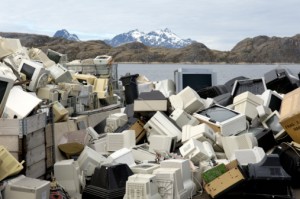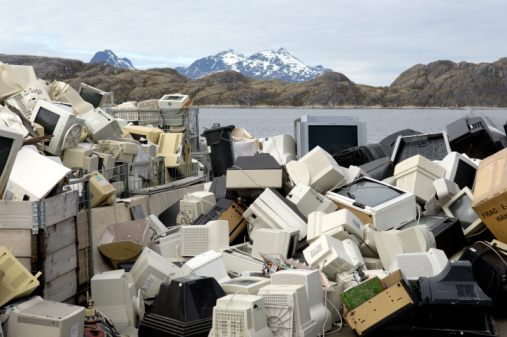 We love our electronics, don’t we? There seems to be hundreds of new and improved gadgets hitting the market every day. Today however, the headaches of recycling computers and the rest of the e-waste abound. It also happens to be one of the most controversial issues. You see, it appears our spending and recycling habits affect much more than our local landfill.
We love our electronics, don’t we? There seems to be hundreds of new and improved gadgets hitting the market every day. Today however, the headaches of recycling computers and the rest of the e-waste abound. It also happens to be one of the most controversial issues. You see, it appears our spending and recycling habits affect much more than our local landfill.
For years now we have been stuffing our homes, cars, offices, pockets wit the most exiting technologies that makes our lives easier and more fun. Like our own bodies thought these items tend to age and eventually brake down. So what do we do with them?
It’s easy to recycle paper, plastic and aluminum cans but how do we recycle a computer and all of its components? Or that grandma’s TV from the world war two era? There are no bins in our drive way to toss that tv, vcr, fax machine and all those crazy gadgets we bought a year ago on a Christmas binge. So where does all this “e-waste” go? Unfortunately, most of it heads straight into the nearest dumpster.
According to Silicon Valley Toxics Coalition (SVTC), electronic discards is one of the fastest growing sector of our nation’s waste stream:
– There are 500 million obsolete computers in the U.S. alone.
– 130 million cell phones are disposed of annually.
– 20 – 24 million TV’s and computers are stored annually in homes and offices.
– Only 10% of unwanted and obsolete computers are recycled.
Now, as eco mindful earthlings we make an effort to recycle them somehow, don’t we? Some of us will even find a local e-waste recycler and happily rub our palms after we drop of our age old computer at the “right” place.
Its’s safe to bet that most of us truly think that e-waste recycling means that it’s all nicely dissembled by some factory robots, melted and re-manufactured into brand shiny new computer to buy at our Local Fry’s store. All is cool and dandy. Not exactly.
 The ugly truth about E-waste recycling is that most of this toxic trash ends up in the villages of third world countries. Metroactive published a provocative article in 2007 called “Toxic Outsourcing” which brought to our awareness some important issues: “’State authorized recyclers’ and ‘free electronic recycling’ are soothing Silicon Valley’s conscience about E-waste. But the dirty truth behind the feel-good slogans is that our high-tech industry is piling up millions of tons of hazardous waste around the globe.” If you have any doubt about this watch this BAN.ORG video called “The Digital Dump – Exporting the Re-use and Abuse to Africa.” It’s quite emotional and convincing.
The ugly truth about E-waste recycling is that most of this toxic trash ends up in the villages of third world countries. Metroactive published a provocative article in 2007 called “Toxic Outsourcing” which brought to our awareness some important issues: “’State authorized recyclers’ and ‘free electronic recycling’ are soothing Silicon Valley’s conscience about E-waste. But the dirty truth behind the feel-good slogans is that our high-tech industry is piling up millions of tons of hazardous waste around the globe.” If you have any doubt about this watch this BAN.ORG video called “The Digital Dump – Exporting the Re-use and Abuse to Africa.” It’s quite emotional and convincing.
The reasons behind this mess is today’s loopholes in the law. You see, California only pays to recycle certain components and allows the rest of the junk to be exported and sold by brokers around the globe. This has become a growth industry in itself. So according to the article, “Even when we think we’re recycling them, we’re generating Mt. Everest-size piles of toxic waste that are exported overseas. It is shipped to global junk heaps where the world’s poor earn a couple of dollars a day breaking E-stuff apart by hand to recapture whatever can be sold.”
No wonder we, the consumers, are confused. All these “participating” collectors can call themselves “state authorized recyclers” and advertise “free electronic recycling” but they only recycle a few items and sell the rest. So what do we do?
Fortunately, The California Environmental Protection Agency (CAL/EPA) constantly revises their hazardous waste regulations (CA Universal Waste Rule) and adds new provisions and standards for handlers of universal waste. Early this year CAL/EPA also added new disposal and management requirements for electronic waste. Right now, these new standards (hopefully followed by some of the E-waste recyclers) is our only hope.
California’s Integrated Waste Management Board CIWMB website has a list of approved vendors in Santa Clara County that will pick-up and dispose of your e-waste in accordance with the regulatory obligations set forth by the State of California’s Universal Waste Rule. When you visit the website, you’ll be able to enter a specific piece of equipment you want to recycle, then choose Santa Clara County and then find a location near you to drop off “goods”.
One good rule of thumb before you load up your Hybrid: Call and find out exactly what these vendors can recycle, what are the charges if any, and where will our e-waste actually go. I called one of the local recyclers and they assured me this stuff gets broken down locally and does not leave the country. So I took my old PC there.
Keep in mind that even some of our local electronics stores have in-store programs that simplify the recycling process. Office Depot, for instance, offers a tech recycling service that gives you a box to stuff with as many old electronics as possible for shipping to a recycling service. The service costs between $5 and $15. Staples has a similar service, for $10, that ships equipment to Eco International. Even the U.S. Postal Service encourages e-cycling: their Free and Green program allows a consumer to discard small electronics—like PDAs, digital cameras, MP3 players—without having to pay for postage.
Please check that list of approved local recyclers in San Jose and find one close to you. You’ll only have to do this once. If you can help your neighbor down the road then even better. The idea is that we really have no excuses not to recycle our e-waste or recycle it with some vendor who could careless about the environment.
Without doubt, we’re the most privileged people in the history of the world. We also happen to be the country that produces the most waste and affect the rest of the planet. With a drop of awareness about this issue and an extra effort to recycle our toxic waste the right way we can extend the same privilege we have today to the future generations.
Additional Resources:
Silicon Valley Toxics Coalition is a diverse organization engaged in research, advocacy and grassroots organizing to promote human health and environmental justice in response to the rapid growth of the high-tech industry.
eRecycle.org is specially designed for recycling electronic wastes and answering any additional questions.
Earth911.org lists information on all facilities that collect and recycle universal wastes and household hazardous wastes
10 Things to Recycle That You Never Thought You Could

 How the Danish Island of Samsø Completely Wiped Out its Carbon Footprint
How the Danish Island of Samsø Completely Wiped Out its Carbon Footprint Rooftop Solar Lease Revisited: 5 Disadvantages or the Facts Leasing Companies Don’t Want you to Know
Rooftop Solar Lease Revisited: 5 Disadvantages or the Facts Leasing Companies Don’t Want you to Know Meat the Biggest Polluter in the World!
Meat the Biggest Polluter in the World!